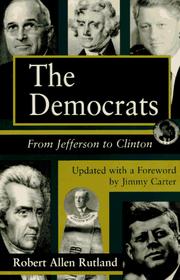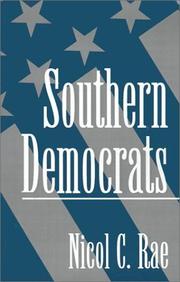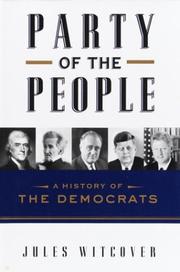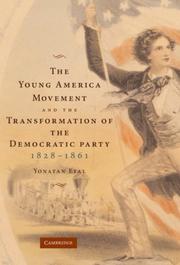| Listing 1 - 10 of 40 | << page >> |
Sort by
|

ISBN: 082626154X 9780826261540 0826210341 9780826210340 Year: 1995 Publisher: Columbia University of Missouri Press
Abstract | Keywords | Export | Availability | Bookmark
 Loading...
Loading...Choose an application
- Reference Manager
- EndNote
- RefWorks (Direct export to RefWorks)
Democratic Party (U.S.) --- Republican Party (U.S. : 1792-1828) --- Demokratische Partei (U.S.) --- Partai Demokrat (U.S.) --- History.

ISBN: 0521858275 0521675006 9780511388828 0511388829 9780511611506 0511611501 9780521858274 9780521675000 1107177316 1281254533 9786611254537 0511387830 0511386842 0511385013 0511383142 Year: 2006 Publisher: Cambridge New York Cambridge University Press
Abstract | Keywords | Export | Availability | Bookmark
 Loading...
Loading...Choose an application
- Reference Manager
- EndNote
- RefWorks (Direct export to RefWorks)
This book examines the dynamics of the American party system and explores how contemporary American politics was formed. Specifically, it asks how the Democrats could become sufficiently competitive in the American North as to be able to construct a national political majority. It rejects the conventional account, based on 'realignment theory', that between the end of Reconstruction and the Civil Rights Revolution, the base level of support for the Democratic party varied greatly from one era to another. Instead, by distinguishing between the 'building blocks' available to the Democrats in coalition formation and the aggregation of those 'blocks' into an actual coalition, the author shows that there was much less variation over time in the available 'blocks' than is usually argued. Neither the economic depression of 1893 nor the New Deal had the impact on the party system that most political scientists claim.
Democratic Party (U.S.) --- History. --- History --- Demokratische Partei (U.S.) --- Partai Demokrat (U.S.) --- Republican Party (U.S. : 1792-1828) --- Social Sciences --- Political Science

ISBN: 128044231X 0198024770 1423742230 1601299621 9781423742234 9781601299628 9780195087093 0195087097 9780195087086 0195087089 9781280442315 0195087089 0195087097 9780198024774 0197734022 Year: 1994 Publisher: New York : Oxford University Press,
Abstract | Keywords | Export | Availability | Bookmark
 Loading...
Loading...Choose an application
- Reference Manager
- EndNote
- RefWorks (Direct export to RefWorks)
Charts the rise of the southern Democrats as a force in American politics since the 1960s. Drawing on interviews with many southern politicians, it traces the history of southern Democrats from the erosion of their national influence in the early 1960s to the 1992 election of Clinton and Gore.
Political parties --- Democratic Party (U.S.) --- Republican Party (U.S. : 1792-1828) --- Demokratische Partei (U.S.) --- Partai Demokrat (U.S.) --- Southern States --- United States --- Politics and government
Book
ISBN: 9780801454837 0801454832 9780801453267 0801453267 0801454824 Year: 2014 Publisher: Ithaca London
Abstract | Keywords | Export | Availability | Bookmark
 Loading...
Loading...Choose an application
- Reference Manager
- EndNote
- RefWorks (Direct export to RefWorks)
In the decade before the Civil War, Northern Democrats, although they ostensibly represented antislavery and free-state constituencies, made possible the passage of such proslavery legislation as the Compromise of 1850 and Fugitive Slave Law of the same year, the Kansas-Nebraska Act of 1854, and the Lecompton Constitution of 1858. In Northern Men with Southern Loyalties, Michael Todd Landis forcefully contends that a full understanding of the Civil War and its causes is impossible without a careful examination of Northern Democrats and their proslavery sentiments and activities. He focuses on a variety of key Democratic politicians, such as Stephen Douglas, William Marcy, and Jesse Bright, to unravel the puzzle of Northern Democratic political allegiance to the South. As congressmen, state party bosses, convention wire-pullers, cabinet officials, and presidents, these men produced the legislation and policies that led to the fragmentation of the party and catastrophic disunion.Through a careful examination of correspondence, speeches, public and private utterances, memoirs, and personal anecdotes, Landis lays bare the desires and designs of Northern Democrats. He ventures into the complex realm of state politics and party mechanics, drawing connections between national events and district and state activity as well as between partisan dynamics and national policy. Northern Democrats had to walk a perilously thin line between loyalty to the Southern party leaders and answering to their free-state constituents. If Northern Democrats sought high office, they would have to cater to the "Slave Power." Yet, if they hoped for election at home, they had to convince voters that they were not mere lackeys of the Southern grandees.
Sectionalism (United States) --- Slavery --- History --- Political aspects --- Democratic Party (U.S.) --- Demokratische Partei (U.S.) --- Partai Demokrat (U.S.) --- Republican Party (U.S. : 1792-1828)
Book
ISBN: 1316997588 1108699707 1108482120 Year: 2020 Publisher: Cambridge : Cambridge University Press,
Abstract | Keywords | Export | Availability | Bookmark
 Loading...
Loading...Choose an application
- Reference Manager
- EndNote
- RefWorks (Direct export to RefWorks)
The Democrats' decision to nominate Joe Biden for 2020 was hardly a fluke but rather a strategic choice by a party that had elevated electability above all other concerns. In Learning from Loss, one of the nation's leading political analysts offers unique insight into the Democratic Party at a moment of uncertainty. Between 2017 and 2020, Seth Masket spoke with Democratic Party activists and followed the behavior of party leaders and donors to learn how the party was interpreting the 2016 election and thinking about a nominee for 2020. Masket traces the persistence of party factions and shows how interpretations of 2016 shaped strategic choices for 2020. Although diverse narratives emerged to explain defeat in 2016 - ranging from a focus on 'identity politics' to concerns about Clinton as a flawed candidate - these narratives collectively cleared the path for Biden.
Democratic Party (U.S.) --- Demokratische Partei (U.S.) --- Partai Demokrat (U.S.) --- Republican Party (U.S. : 1792-1828) --- History --- Political parties

ISBN: 0375507426 Year: 2003 Publisher: New York (N.Y.) Random House
Abstract | Keywords | Export | Availability | Bookmark
 Loading...
Loading...Choose an application
- Reference Manager
- EndNote
- RefWorks (Direct export to RefWorks)
Book
ISBN: 1282298828 9786612298820 1576755479 9781576755471 9781609944230 1609944232 Year: 2008 Publisher: San Francisco : Berrett-Koehler,
Abstract | Keywords | Export | Availability | Bookmark
 Loading...
Loading...Choose an application
- Reference Manager
- EndNote
- RefWorks (Direct export to RefWorks)
Shows how the 3 core progressive values - Freedom, Opportunity, Security - define the collective aspirations that drive the American nation, and how progressives can use this framework of values to communicate with "persuadable" voters.
Liberalism --- Social values --- Liberal egalitarianism --- Liberty --- Political science --- Social sciences --- Democratic Party (U.S.) --- Republican Party (U.S. : 1792-1828) --- Demokratische Partei (U.S.) --- Partai Demokrat (U.S.) --- United States --- Politics and government

ISBN: 9780511511561 9780521875646 9781107407763 9780511335501 0511335504 0511511566 0521875641 1107407761 1107182212 1281040568 9786611040567 1139132954 0511334923 051133432X 0511333641 Year: 2007 Publisher: Cambridge ; New York : Cambridge University Press,
Abstract | Keywords | Export | Availability | Bookmark
 Loading...
Loading...Choose an application
- Reference Manager
- EndNote
- RefWorks (Direct export to RefWorks)
The phrase 'Young America' connoted territorial and commercial expansion in the antebellum United States. During the years leading up to the Civil War, it permeated various parts of the Democratic party, producing new perspectives in the realms of economics, foreign policy, and constitutionalism. Led by figures such as Senator Stephen A. Douglas of Illinois and editor John L. O'Sullivan of New York, Young America Democrats gained power during the late 1840s and early 1850s. They challenged a variety of orthodox Jacksonian assumptions, influencing both the nation's foreign policy and its domestic politics. This 2007 book offers an exclusively political history of Young America's impact on the Democratic Party, complementing existing studies of the literary and cultural dimensions of this group. This close look at the Young America Democracy sheds light on the political realignments of the 1850s and the coming of the Civil War, in addition to showcasing the origins of America's longest existing political party.
Democratic Party (U.S.) --- Demokratische Partei (U.S.) --- Partai Demokrat (U.S.) --- Republican Party (U.S. : 1792-1828) --- History --- United States --- Politics and government --- Economic conditions --- Arts and Humanities

ISBN: 0521420598 0521034590 0511528027 Year: 1996 Publisher: Cambridge : Cambridge University Press,
Abstract | Keywords | Export | Availability | Bookmark
 Loading...
Loading...Choose an application
- Reference Manager
- EndNote
- RefWorks (Direct export to RefWorks)
This 1996 book analyses the dramatic changes in American politics that occurred during the 1930s and 1940s - including the break-up of national Republican power, the growth of the federal government, the emergence of a new labour movement, American entry into World War II, the Cold War and domestic anti-Communism, and the opening of national political debate about civil rights. The central dynamic of this era was the creation and maintenance of a distinctive new political order, formed through the creative political action of progressive liberals in alliance with mass movements, notably labour. At the core of this new order was a powerful triangle formed by a national state, a leading party, and major nonparty interest groups and movements. Democratic progressive liberalism recast American political institutions and discourses in ways that went well beyond what was expected in the early 1930s, and in forms strong enough to endure for several decades after Roosevelt's death.
Democratic Party (U.S.) --- United States --- Politics and government --- 1933-1953 --- Liberalism --- Social Sciences --- Political Science --- Liberal egalitarianism --- Liberty --- Political science --- Social sciences --- Demokratische Partei (U.S.) --- Partai Demokrat (U.S.) --- Republican Party (U.S. : 1792-1828)
Book
ISBN: 0292744528 0292719647 Year: 2012 Publisher: Austin : University of Texas Press,
Abstract | Keywords | Export | Availability | Bookmark
 Loading...
Loading...Choose an application
- Reference Manager
- EndNote
- RefWorks (Direct export to RefWorks)
When Ann Richards delivered the keynote of the 1988 Democratic National Convention and mocked President George H. W. Bush—“Poor George, he can’t help it. He was born with a silver foot in his mouth”—she instantly became a media celebrity and triggered a rivalry that would alter the course of American history. In 1990, Richards won the governorship of Texas, upsetting the GOP’s colorful rancher and oilman Clayton Williams. The first ardent feminist elected to high office in America, she opened up public service to women, blacks, Hispanics, Asian Americans, gays, and the disabled. Her progressive achievements and the force of her personality created a lasting legacy that far transcends her rise and fall as governor of Texas. In Let the People In, Jan Reid draws on his long friendship with Richards, interviews with her family and many of her closest associates, her unpublished correspondence with longtime companion Bud Shrake, and extensive research to tell a very personal, human story of Ann Richards’s remarkable rise to power as a liberal Democrat in a conservative Republican state. Reid traces the whole arc of Richards’s life, beginning with her youth in Waco, her marriage to attorney David Richards, her frustration and boredom with being a young housewife and mother in Dallas, and her shocking encounters with Lyndon Johnson and Jimmy Carter. He follows Richards to Austin and the wild 1970s scene and describes her painful but successful struggle against alcoholism. He tells the full, inside story of Richards’s rise from county office and the state treasurer’s office to the governorship, where she championed gun control, prison reform, environmental protection, and school finance reform, and he explains why she lost her reelection bid to George W. Bush, which evened his family’s score and launched him toward the presidency. Reid describes Richards’s final years as a world traveler, lobbyist, public speaker, and mentor and inspiration to office holders, including Hillary Clinton. His nuanced portrait reveals a complex woman who battled her own frailties and a good-old-boy establishment to claim a place on the national political stage and prove “what can happen in government if we simply open the doors and let the people in.”
Governors --- Politicians --- Richards, Ann, --- Democratic Party (U.S.) --- Texas --- Politics and government --- Richards, Dorothy Ann, --- Willis, Ann, --- Willis, Dorothy Ann, --- Demokratische Partei (U.S.) --- Partai Demokrat (U.S.) --- Republican Party (U.S. : 1792-1828)
| Listing 1 - 10 of 40 | << page >> |
Sort by
|

 Search
Search Feedback
Feedback About UniCat
About UniCat  Help
Help News
News